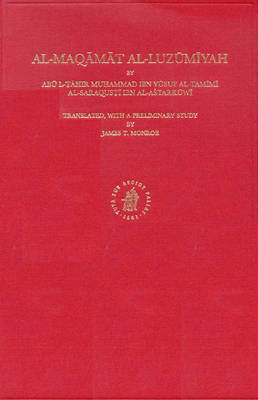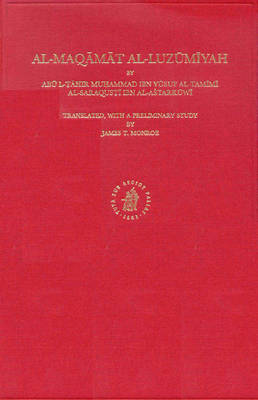
- Afhalen na 1 uur in een winkel met voorraad
- Gratis thuislevering in België vanaf € 30
- Ruim aanbod met 7 miljoen producten
- Afhalen na 1 uur in een winkel met voorraad
- Gratis thuislevering in België vanaf € 30
- Ruim aanbod met 7 miljoen producten
Zoeken
Al-Maqāmāt Al-Luzūmīya by Abū L-Ṭāhir Muḥammad Ibn Yūsuf Al-Tamīmī Al-Saraqusṭī, Ibn Al-Astarkūwī (D. 538/1143)
James Monroe
€ 505,45
+ 1010 punten
Omschrijving
Although the Arabic maqāmah, a branch of the picaresque genre, was much cultivated in the Middle Ages, little is known about it aside from the works of al-Hamadhānī and al-ḥarīrī, its first two cultivators. This translation of the Maqāmāt al-luzūmīyah by the twelfth-century Andalusi
author al-Saraqustī makes available to Western scholars of narrative prose a hitherto little-known but important collection of Arabic maqāmāt.
The "Preliminary Study" places this specific collection in the context of the overall maqama genre, it further places that genre in the contexts both of Arabic and of world literature, exploring the differences between the picaresque genre and the modern novel. It discusses the meaning of the work, shows the way in which it is original within its genre, and
establishes its organic unity. Finally, it shows that late and post-classical Arabic literary works such as that of al-Saraqustī, which were composed during the so-called "period of decadence," are not decadent at all, contrary to the opinion prevalent among scholars in the field.
author al-Saraqustī makes available to Western scholars of narrative prose a hitherto little-known but important collection of Arabic maqāmāt.
The "Preliminary Study" places this specific collection in the context of the overall maqama genre, it further places that genre in the contexts both of Arabic and of world literature, exploring the differences between the picaresque genre and the modern novel. It discusses the meaning of the work, shows the way in which it is original within its genre, and
establishes its organic unity. Finally, it shows that late and post-classical Arabic literary works such as that of al-Saraqustī, which were composed during the so-called "period of decadence," are not decadent at all, contrary to the opinion prevalent among scholars in the field.
Specificaties
Betrokkenen
- Auteur(s):
- Uitgeverij:
Inhoud
- Aantal bladzijden:
- 626
- Taal:
- Engels
- Reeks:
- Reeksnummer:
- nr. 22
Eigenschappen
- Productcode (EAN):
- 9789004123311
- Verschijningsdatum:
- 26/10/2001
- Uitvoering:
- Hardcover
- Formaat:
- Genaaid
- Afmetingen:
- 167 mm x 244 mm
- Gewicht:
- 1238 g

Alleen bij Standaard Boekhandel
+ 1010 punten op je klantenkaart van Standaard Boekhandel
Beoordelingen
We publiceren alleen reviews die voldoen aan de voorwaarden voor reviews. Bekijk onze voorwaarden voor reviews.








